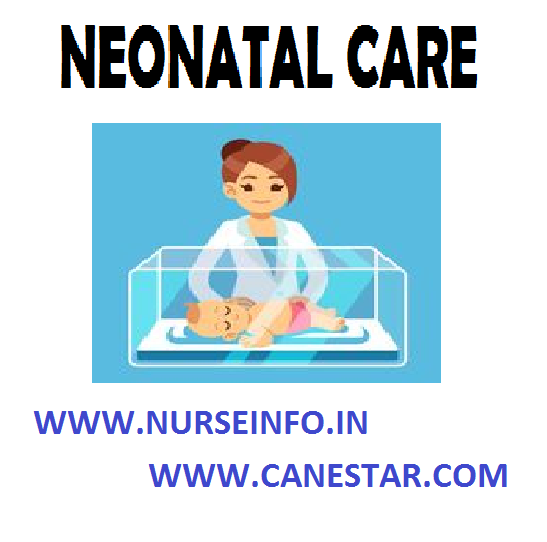NEONATAL CARE – Objectives of Early Neonatal Care, Immediate Care and Neonatal Examination (CHILD HEALTH NURSING)
Neonatal period is defined as birth up to the first 28 days of life. First week (7 days) of life is called early neonatal period. Late neonatal period extends from 7th day to less than 28th day of life
Early neonatal care is the first week of life and is the most crucial period in the life of an infant. The risk of death is the greatest during the first 24-48 hours after birth
OBJECTIVES OF EARLY NEONATAL CARE
- Maintenance of body temperature
- Establishment and maintenance of cardiorespiratory function
- Avoidance of infection
- Establishment of satisfactory feeding regimen
- Early detection and treatment of congenital and acquired disorders, especially infections
IMMEDIATE CARE
Clearing the airway: establishment and maintenance of cardiorespiratory function is the most important steps of the moment of baby are born. To help establish breathing, the airway should be cleared of mucus and other secretions
Apgar score: it is taken at 1 minute and again at 5 minutes after birth. It requires immediate and careful observation of the heart rate, respiration, muscle tone, reflex response and color of the infant
A score below 5 needs prompt action, APGAR score at 5 minutes of age are subjected to a high risk of complications and death during the neonatal period
Care of the cord: umbilical cord should be cut and tied when it has stopped pulsating. Care must be taken to prevent tetanus of the newborn by using properly sterilized instruments and cord ties. The cord should be kept dry as possible
Care of the eyes: before the eyes are open, the lid margin of newborn should be cleaned with sterile wet swabs. One for each eye is from inner to outside. Instill a drop of freshly prepared silver nitrate solution 1% to prevent gonococcal conjunctivitis
Care of the skin: first bathing may be delayed for 12-24 hours after birth to avoid cooling the body temperature
Maintenance of body temperature: newborn has little thermal control and can lose body heat quickly. The normal body temperature of a newborn is between 36.5 to 37.5 degree celcius. It is important that immediately after birth the child is quickly dried with a clean for skin-to-skin contact and breast feeding
Breastfeeding: breastfeeding should be initiated within an hour of birth instead of waiting several hours as is often customary. The first milk which is called “colostrums” is the most suitable food for the baby during this early period because it contains a high concentration of protein and other nutrient the baby needs
NEONATAL EXAMINATION
First examination is made soon after birth and preferably in the delivery room
- To ascertain in the baby has not suffered injuries during the birth process
- To detect malfunctions especially those requiring urgent treatment
- To assess maturity
Second examination should be done preferably by a pediatrician within 24 hours after birth. It is a detailed systematic examination from head to foot. It includes body size, temperature, skin, cardiovascular activities neurobehavioral activities of head and face, abdomen, limb and joints, spine and external genitalia


